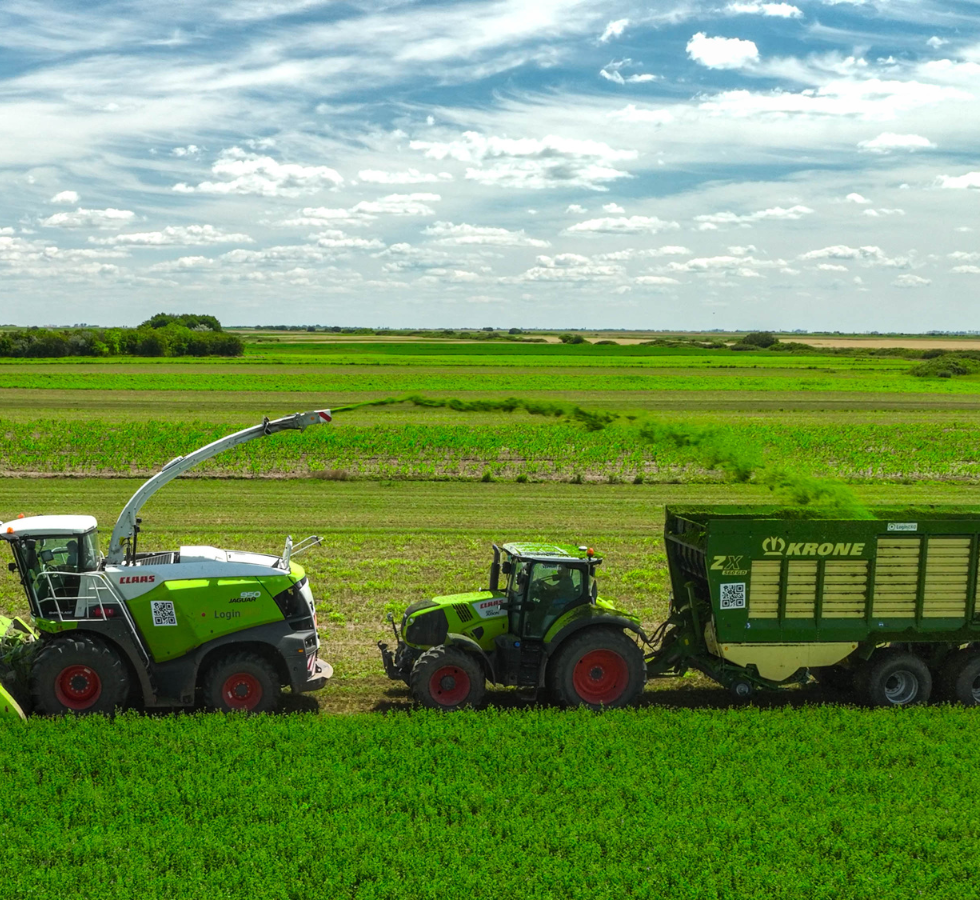How We Handle Late Weeds in Organic Flax
June 25, 2025Ahead of this year’s flax harvest, we tackled late-stage weeds with the Top Cut Collect. Learn how we cleaned up the field and why it was worth it.
Read articleIn the pursuit of sustainable agriculture, we constantly explore innovative methods to promote soil health and fertility. Green manure practices, such as the utilization of alfalfa silage, has a role in enriching the soil with essential nutrients for subsequent crop growth.

The journey of alfalfa silage begins with the careful cutting process, where the alfalfa plants are harvested (this link will take you to the field map in our Farming software at the time of this operation) at the optimal time to ensure their quality and nutrient content. By timing the harvest correctly, farmers can maximize the nutritional value of the crop, making it an excellent source of soil nourishment.
The silo combine simultaneously cuts, chops, and loads the freshly harvested alfalfa into the trailer, streamlining the harvesting process and facilitating efficient transportation. After harvesting and chopping the alfalfa, it’s time for a crucial step in the process of making high-quality alfalfa silage. We need to compact the freshly cut and still moist biomass into an improvised silo pit using heavy tractors, making multiple passes. The goal here is to extract air from the biomass, creating the perfect conditions for anaerobic fermentation. This fermentation process preserves the organic nitrogen present in the alfalfa, ensuring its nutrient integrity and making it an excellent source of organic fertilizer for future use. Compacting the chopped alfalfa biomass is a key practice that farmers employ to maximize the benefits of this valuable crop and ensure its optimal utilization on their farms.
After compaction, the alfalfa is stored in a trench or silo, which provides optimal conditions for fermentation and preservation. This storage method safeguards the nutritional value of the alfalfa, allowing it to be utilized at a later stage. We use it to nourish our soil and provide enough nitrogen for succeeding crops.
The cut & carry green manure strategy is specifically designed for the most demanding production, particularly for irrigated vegetable production. Alfalfa, renowned for its high nitrogen content, serves as a valuable component in this strategy. Nitrogen, a vital element essential for plant growth and development, plays a crucial role in fostering healthy foliage, increasing yield, and enhancing overall crop quality. By incorporating alfalfa silage into the soil, farmers can naturally replenish nitrogen levels, reduce their reliance on synthetic fertilizers, and minimize the environmental impact. This sustainable approach not only ensures the nutrient needs of the crops are met, but also promotes soil health and long-term sustainability in irrigated vegetable production.
Additionally, alfalfa possesses deep root systems, enabling it to scavenge nutrients from deep within the soil profile. As a result, it accumulates essential minerals and trace elements, which are released back into the soil upon decomposition. This process contributes to the overall improvement of soil structure, nutrient availability, and water-holding capacity, fostering a healthy and sustainable farming environment.
Conclusion
Alfalfa silage production and utilization as a green manure practice offer numerous benefits for sustainable farming. By incorporating this process into their agricultural systems, farmers can enhance soil fertility, reduce the reliance on synthetic fertilizers, and promote a more environmentally friendly approach. Alfalfa’s nitrogen-rich composition and its ability to improve soil structure make it an invaluable resource for maintaining the long-term health and productivity of farmland.
Ahead of this year’s flax harvest, we tackled late-stage weeds with the Top Cut Collect. Learn how we cleaned up the field and why it was worth it.
Read articleWe’re back in the field with our chickpea cultivation series! See how we tackle weeds after emergence using inter-row cultivation.
Read articleTwo days, three farms, one shared goal: growing hemp more sustainably. Here’s what we learned and shared during our tour of Prekmurje.
Read article